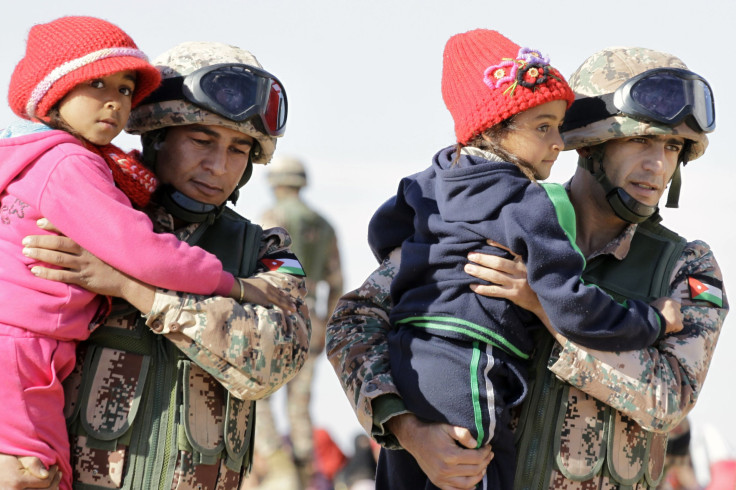Syrian Refugee Crisis 2016: At Davos, Leaders Push For More Schools For Migrant Children

The number of Syrian refugee children who have fled their country due to terrorism and other conflict will likely exceed 2.5 million this year. They're part of the "greatest humanitarian crisis since 1945," said Gordon Brown, the former British prime minister who is now a United Nations special envoy on global education.
Brown has a proposal to help the growing number of kids, and it revolves around another figure: 1 million. That's how many places of learning he wants to create by the end of the year in Lebanon, Jordan and Turkey to serve Syrian children forced out of their classrooms.
Brown joined a group of international education advocates Thursday for a news conference at the World Economic Forum in Davos, Switzerland, to ask for compassion — and money. His recently released plan to offer education to refugee children would cost about $750 million; he has raised only part of that amoung so far. But Brown and the other panelists said the seriousness of the situation is growing, with the potential to lose a generation of students to extremism, early marriage or human trafficking.
"If we do nothing, thousands could go through their school-age years without ever being in the classroom," said Brown. "With the Davos business community, we want to be clear: There is no solution to the exodus to Europe without the expansion of education in the region."
"We will spare no efforts to bring all #Syrian #refugee children back to school" @JHahnEU #EUatDavos #WEF2016 #Davos https://t.co/Dv14Goao3J
— European Commission (@EU_Commission) January 21, 2016The Syrian civil war and rise of the Islamic State group has led to a refugee crisis over the past year as residents have attempted to escape the violence. More than 4 million of them settled in Lebanon, Jordan and Turkey.
However, without schools there for their children, "many parents see no choice but to leave the region and embark on what have become for so many 'death voyages' to Europe," Brown said, referencing the fatal accidents that have regularly occurred as refugees attempt to cross the Mediterranean Sea on makeshift boats. More than 3,300 people died in sea passages to Europe last year, according to the International Organization for Migration. About 185 children reportedly died in the Aegean Sea alone.
Brown said the education issue has partially been addressed by a double-shift system, which lets local kids and teachers use school buildings in the morning and refugee children use them in the afternoon. But the number of refugees is rising, and humanitarian budgets devote only about 2 percent of their aid to education, said Anthony Lake, executive director of the United Nations Children's Fund.
At Thursday's news conference , Lake said the longer children go without regular education, the longer it takes to get them reacquainted with the school system. Johannes Hahn of the European Commission said kids migrating or not in school are at increased risk of early marriage, human trafficking or radicalization. If they move, they also might not return to Syria — which will need educated citizens to help it rebuild in a few years, Hahn said.
"Those children are the future of Syria and, to a larger extent, the surrounding countries," Lake said. He added that Brown's education initiative was "in the strategic interest of the world" because if the kids' hearts and minds don't heal from the conflict, they may replicate the violence.
"We will lose out on the generation," said Borge Brende, Norway's foreign affairs minister.
But if they have school, they can turn their lives around, said John Sexton, the former president of New York University. Sexton, who also works with the nonprofit online University of the People, said the higher education community would accept the refugee students. They could take classes in English and Arabic and receive scholarships, he said.
"We will provide them with the education they deserve," Sexton said.
© Copyright IBTimes 2024. All rights reserved.












